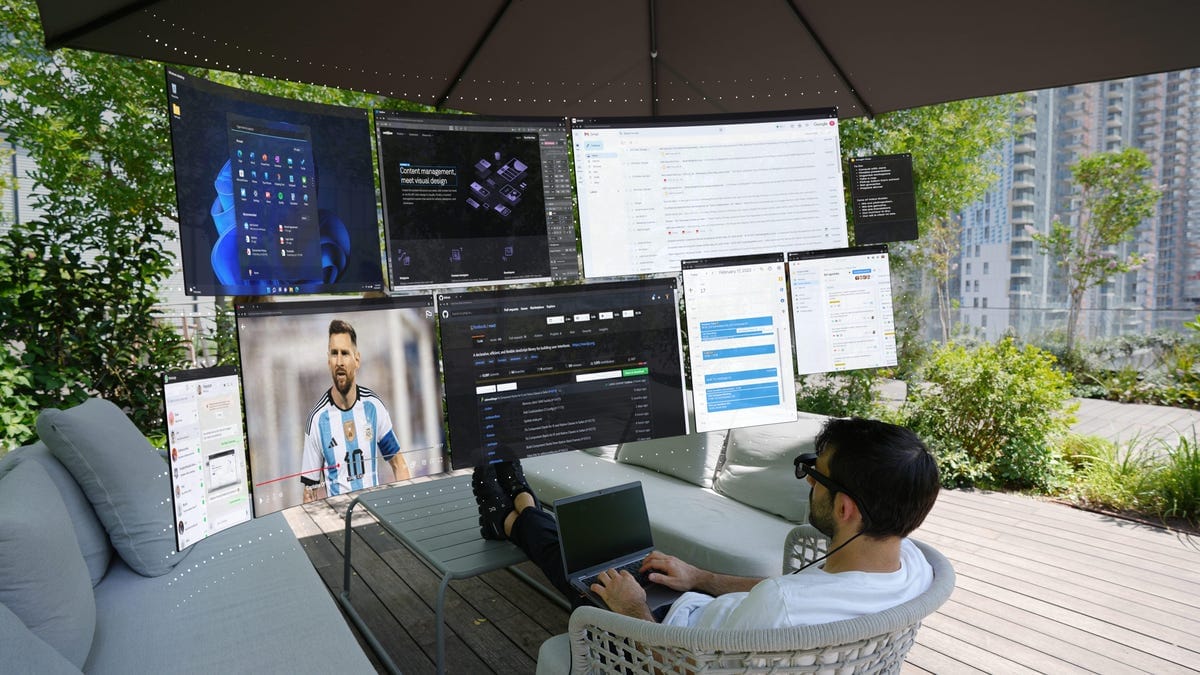Sightful has canceled Spacetop G1 and can refund all preorder deposits.
Spacetop G1 was set to be a screenless laptop computer with built-in Xreal Air 2 Extremely AR glasses, priced at $1900. It might have been powered by Qualcomm’s Snapdragon 8 Gen 2 chipset, operating Sightful’s proprietary Spacetop OS working system.
Sightful has emailed everybody who preordered Spacetop G1 to supply them a refund of their $100 deposit, and the corporate will not be delivery {hardware} in any respect, because it first confirmed to CNET.
Spacetop G1: Upgraded Screenless Laptop computer With AR Glasses
Spacetop G1 replaces the display of conventional laptops with floating digital screens through built-in Xreal AR glasses.
As a substitute, Sightful plans to construct AR system software program utilizing Xreal Air 2 Extremely on Home windows laptops with an NPU, which means these with Qualcomm Snapdragon, Intel Core Extremely, or AMD Ryzen AI chipsets.
This software program will take the canceled {hardware}’s title Spacetop, and proceed the spatial computing idea of Spacetop OS. However fairly than simply spawning floating net browser home windows, it should now spawn Home windows purposes out of your laptop computer.
The concept is that after you have the Spacetop Home windows software program put in, you simply join the Xreal glasses through USB-C to your laptop computer, with the laptop computer offering each energy and compute, and every little thing ought to work mechanically.
Xreal glasses already help displaying your Home windows laptop computer’s display as a head-fixed digital monitor, however Spacetop software program will apparently enable each 6DoF positional monitoring and spawning of a number of Home windows purposes in area, not confined to a display paradigm.
Sightful’s founders Tamir Berliner and Tomer Kahan, each ex-Magic Leap executives, say the choice to shift technique was taken as a result of laptops getting NPUs now imply they will run 6DoF monitoring with out compromising efficiency and battery life. Having the ability to obtain an AR spatial computing workspace with the Home windows laptop computer you already personal, or at the least the subsequent laptop computer you have been going to purchase in any case, additionally makes for a a lot wider market than what would have primarily been a $1200 ($1900 minus the glasses) single-purpose spatial computing Chromebook with no display

However no matter how clear AR spatial computing is delivered, a customized laptop computer or your individual, the limiting issue stays the sector of view. As we famous in our assessment of Nreal Mild, which had a really comparable subject of view, you will solely see all of the floating home windows without delay in the event that they’re positioned a number of meters away. At extra affordable viewing distances you will have to show your head extra usually than with bodily screens and bear in mind the place purposes are. That is presently the important thing tradeoff of clear AR versus opaque headsets with passthrough cameras, and why Meta’s Orion prototype is praised for lastly fixing it – albeit not in a means that may be mass produced any time quickly.
The Spacetop software program for Home windows is about to launch by the top of this yr, completely operating on laptops with an NPU, which Microsoft manufacturers CoPilot+ PCs.
